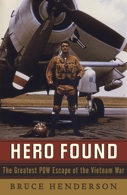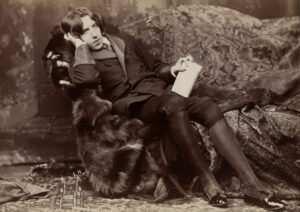“As I stood there [onboard USS Ranger] clapping and whistling to help welcome back our hero pilot, Dieter Dengler, I was thinking this is like a scene in a Hollywood movie,” Henderson said.
 As a 19-year-old third-class aerographer’s mate on the carrier Ranger in 1966, Bruce Henderson remembers hearing some of the VA-145 pilots say, “If anyone can get out, our guy Dieter can.” Two pilots flying off the carrier had just been shot down on the same day, one of them being Lieutenant (j.g.) Dieter Dengler. Sure enough, six months later, after pulling off the Vietnam War’s greatest POW escape, an emaciated Dengler returned from the dark heart of Laos to a raucous welcome on Ranger. “As I stood there clapping and whistling to help welcome back our hero pilot, I was thinking this is like a scene in a Hollywood movie,” Henderson said.
As a 19-year-old third-class aerographer’s mate on the carrier Ranger in 1966, Bruce Henderson remembers hearing some of the VA-145 pilots say, “If anyone can get out, our guy Dieter can.” Two pilots flying off the carrier had just been shot down on the same day, one of them being Lieutenant (j.g.) Dieter Dengler. Sure enough, six months later, after pulling off the Vietnam War’s greatest POW escape, an emaciated Dengler returned from the dark heart of Laos to a raucous welcome on Ranger. “As I stood there clapping and whistling to help welcome back our hero pilot, I was thinking this is like a scene in a Hollywood movie,” Henderson said.
After Vietnam, Henderson went to college and became a newspaper reporter, but Dengler’s story was never far away. “I must have told that story hundreds of times over the years,” Henderson said. “Then, being a reporter, I decided to find Dieter and write his story. When I found him in the 1970s, he was an airline pilot. I wrote an article then and we stayed in touch, but still, I always felt one day I would write more of his story.”
In the meantime, Dengler wrote about his POW experience in his 1979 book, Escape from Laos. With both men living in the San Francisco area in the 1990s, they became good friends. Not long after attending Dengler’s 60th birthday party in 1998, Henderson asked him if there was anything more to his story he hadn’t covered in his earlier book. “Yes,” Dengler told Henderson, “there is much to tell about Germany,” and how he was shaped and steeled during harsh years of war and occupation. He believed his extraordinary resilience as a youth made survival in the jungle two decades later possible.
By then Henderson was a bestselling nonfiction author, and, armed with hours of taped interviews with Dengler, he pitched the book idea to several publishers but was told, “Vietnam doesn’t sell.” He told Dieter, “Look, the climate will change one day, and when it does we’ll come back to this.” However, suffering from Lou Gehrig’s Disease, Dengler would not live to work with Henderson on a new book. Dengler’s story served as the basis for two films from director Warner Herzog: Little Dieter Needs to Fly, a 1997 documentary in which Dengler appears; and the 2006 feature Rescue Dawn, based largely on Dengler’s book. Henderson recommends both, but cautions that Rescue Dawn’s depiction of POW Eugene DeBruin as a Charles Manson–like character is not accurate. “Dieter never, ever described Gene DeBruin—who sacrificed himself to help his friend Y.C.—like that in his own book or when he talked to me.”
Bruce Henderson’s book about Dieter Dengler, Hero Found: The Greatest POW Escape of the Vietnam War, published by Harper, went on sale June 29, 2010.
Read Excerpt from Hero Found, published in Vietnam magazine, August 2010




